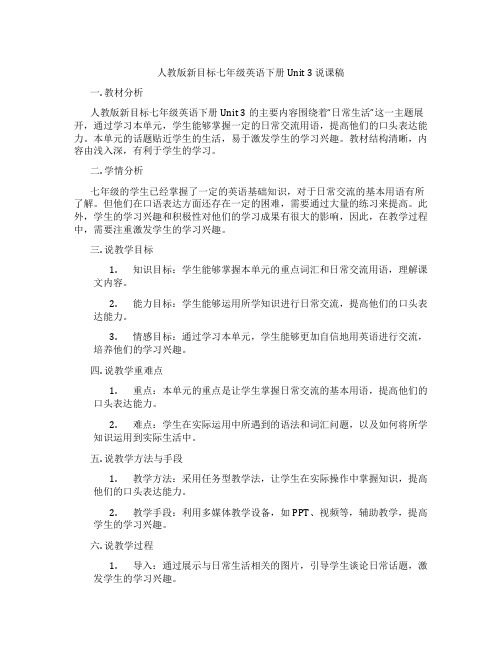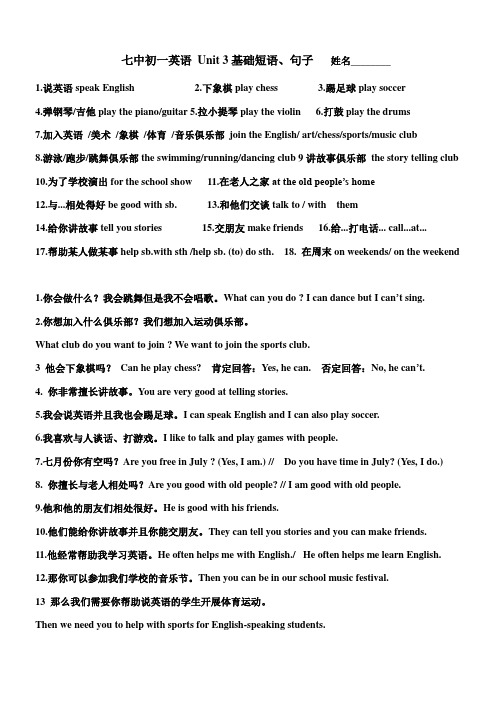七年级英语下:Unit 3 Club Activities esson 3 and esson 4重难点讲解教科版
初中英语新人教版七年级下册Unit3 Section A课文讲解(2025春)

七年级英语下册 Unit3 Section A课文讲解 1.Is it a popular sport in China? 它在中国是一个受欢迎的运动吗? 【用法详解】 此处popular为形容词, 译为“受欢迎的”。 Eg: Playing basketball is a popular sport in China. 打篮球在中国是一项受欢迎的运动。 【常见搭配】be popular with sb. 受某人的欢迎 Eg: This music is very popular with young people. 这种音乐很受年轻人喜爱。 【即学即用】 ( B )1.This singer is popular us. A.for B.with C.as D.among 2.How often do you do sport or exercise? 你多久做一次运动或锻炼? 【用法详解】 sport为名词,译为“运动”。 Eg: Football is my favourite sport. 足球是我最喜欢的运动。 sport为动词,译为“炫耀”。 Eg: She came in today sporting a new car. 她今天炫耀这一辆新车。 【常见搭配】play sports 做运动 Eg: He likes playing sports every day. 他喜欢每天做运动。 Exercise为不可数名词,译为“锻炼”; 【常见搭配】take exercise 锻炼身体 Do exercise 做运动 Eg: We need to take exercise to keep fit. 我们需要锻炼身体来保持健康。 exercise也可为可数名词,译为“体操、练习题”,其复数形式为exercises。 【常见搭配】do morning exercises 做早操 Eg: We often do morning exercise at school. 我们经常在学校做早操。 【易混辨析】 how often, how long和how soon区别: how long “多长时间”用for…或since…引导时间状语回答 how soon “还要多长时间”用于将来时,用“in + 一段时间”回答 how often “多久一次”提问动作发生的频率 Eg: -- How long have you been here? -- For two days. 你在这多久了? 两天了。 -- How soon will you stay there? -- In two days. 你要在这待多久?两天 -- How often do you visit your parents? -- Twice a week. 你多久去看一次你的父母?一周两次。 【即学即用】 ( B )1.-- do you have piano lessons in a week? -- Three times a week. A.How long B.How often C.How soon D.How far ( C )2.-- How can I stay in shape? -- You should do more .Don’t always sit at the desk busy doing your _. A.exercise; exercise B.exercises; exercises C.exercise; exercises D.exercises; exercise ( D )3.-- What’s your favourite _? -- Football. A.season B.subject C.animal D.sport 3.Whose football is it? 它是谁的足球? 【用法小结】 Whose为表示所有关系的特殊疑问代词,主要用于引导对物的主人进行提问的特殊疑问词;它即可为形容词性物主代词也可为名词性物主代词。 注意:作形容词性物主代词时后面需要接名词。 Eg: Whose book is this? 这是谁的书? (形容词性物主代词) Whose is this book? 这是谁的书? (名词性物主代词) 【即学即用】 ( B )1.-- bags are these? -- They’re mine. A.Who B.Whose C.What D.Where 4.I play it three times a week. 我一周打三次乒乓球。 【用法详解】 短语“three times a week”表示频率,即在一定时间内做某事的次数;就其提问时常用how often。 Eg: -- How often do you have a holiday ? 你多久度一次假? -- Twice a year. -- 一年两次。 【知识拓展】 英语“次数”表达为:“一次”用once;“两次”用twice; “三次以上”用“数词 + times”的结构。 Eg: four times 四次 Ten times 十次 How many times 多少次 【即学即用】 ( A )1.-- How often do you go to the library? -- _. A.Five times a week B.Five time a week C.Five times in a week D.Five time in a week 5.Give her a book. 给她一本书。 【用法详解】 Give为动词,译为“给”,后面常接双宾语,即“give sb.sth.= give sth.to sb.”译为“给某人某物”。 Eg: Please give me a glass of milk.= Please give a glass of milk to me. 请给我一杯牛奶。 注意:当sth.为人称代词时,只能用give it/them to sb.的结构。 【常见搭配】give up 放弃 Give in 屈服、让步 Give away 赠送、泄露 Give back 归还 Give out 分发、耗尽 Give off 发出(光、热等) Eg: I have given up drinking coffee. 我已经戒掉喝咖啡了。 After a long argument, he finally gave in. 经过长时间的争论后,他终于让步了。 She gave away all her old toys to charity. 她把所有的旧玩具都捐给了慈善机构。 I will give the book back to you tomorrow. 我明天会把书还给你。 The teacher gave out the exam papers. 老师分发了试卷。 The flower gives off a sweet smell. 这朵花散发出一股香味。 【即学即用】 ( A )1.Look at the book on the desk.Please . A.give it to me B.give me it C.give it me D.give me to it ( D )2.Don’t your dream.It must come true. A.give off B.give out C.give back D.give up 6.Maybe it’s Yaming’s. 也许它是亚明的。 【用法详解】 maybe为副词,译为“大概,或许”,常常位于句首,也可位于句中或句末,表示某种不确定性或推测;可单独使用,也可修饰动词、形容词或整个句子。 Eg: Maybe she is from Beijing. 也许她来自北京。 【知识拓展】 May be为“情态动词 + be动词”的结构,译为“可能是”,常常位于句中,后面需要接名词、形容词或其它动词形态来构成完成的位于。 Eg: She may be from Beijing. 她可能来自北京。 【即学即用】 ( B )1._ she will come this afternoon. A.May be B.Maybe C.Can be D.Must be ( A )2.Tom’s father a soldier. A.may be B.maybe C.can be D.must be 7.Hardly ever. 几乎不。 【用法详解】 Hardly为副词,译为“几乎不”;主要表示否定或极少的含义;在句中常位于动词之前,修饰动词。 Eg: He can hardly fail the exam if he studies hard. 如果他用功学习的话,他几乎不可能考不及格。 The child hardly ate anything for lunch. 孩子午餐几乎没吃什么。 【常见搭配】hardly ever 几乎从不 Hardly any 几乎没有 【知识拓展】 Hard为形容词,译为“困难的; 坚硬的;严厉的”; Eg: It’s very hard to maintain a relationship. 维持一段关系是困难的。 The ground is as hard as stone. 土地硬得像石头。 He was so hard on me last night. 他昨晚对我的态度很差。 hard也可为副词,译为“努力地、艰难地” Eg: I work hard at school. 我在学校努力学习。 They tried hard to succeed. 他们努力工作,以求成功。 【即学即用】 ( D )1.-- How is Susan? -- Oh, I _ see her because she lives abroad. A.always B.often C.almost D.hardly ( C )2.My daughter studies .She goes to sleep before 11 p.m. A.hard; hard B.hardly; hardly C.hard; hardly D.hardly; hard 8.Practice makes perfect. 熟能生巧。 【用法详解】 Practice在此处为名词,译为“练习;实践”; Eg: She needs more practice at playing the piano. 我需要更多练习弹钢琴。
人教版新目标七年级英语下册Unit3说课稿

人教版新目标七年级英语下册 Unit 3 说课稿一. 教材分析人教版新目标七年级英语下册Unit 3的主要内容围绕着“日常生活”这一主题展开,通过学习本单元,学生能够掌握一定的日常交流用语,提高他们的口头表达能力。
本单元的话题贴近学生的生活,易于激发学生的学习兴趣。
教材结构清晰,内容由浅入深,有利于学生的学习。
二. 学情分析七年级的学生已经掌握了一定的英语基础知识,对于日常交流的基本用语有所了解。
但他们在口语表达方面还存在一定的困难,需要通过大量的练习来提高。
此外,学生的学习兴趣和积极性对他们的学习成果有很大的影响,因此,在教学过程中,需要注重激发学生的学习兴趣。
三. 说教学目标1.知识目标:学生能够掌握本单元的重点词汇和日常交流用语,理解课文内容。
2.能力目标:学生能够运用所学知识进行日常交流,提高他们的口头表达能力。
3.情感目标:通过学习本单元,学生能够更加自信地用英语进行交流,培养他们的学习兴趣。
四. 说教学重难点1.重点:本单元的重点是让学生掌握日常交流的基本用语,提高他们的口头表达能力。
2.难点:学生在实际运用中所遇到的语法和词汇问题,以及如何将所学知识运用到实际生活中。
五. 说教学方法与手段1.教学方法:采用任务型教学法,让学生在实际操作中掌握知识,提高他们的口头表达能力。
2.教学手段:利用多媒体教学设备,如PPT、视频等,辅助教学,提高学生的学习兴趣。
六. 说教学过程1.导入:通过展示与日常生活相关的图片,引导学生谈论日常话题,激发学生的学习兴趣。
2.新课呈现:讲解本节课的重点词汇和日常交流用语,让学生进行实际操作,如角色扮演等。
3.课堂练习:设计一些日常交流的场景,让学生进行实际运用,巩固所学知识。
4.课堂小结:对本节课的内容进行总结,让学生明确学习目标。
5.课后作业:布置一些与日常生活相关的任务,让学生课后进行练习,提高他们的口头表达能力。
七. 说板书设计板书设计要清晰、简洁,能够突出本节课的重点内容。
初一下册英语Unit 3 基础知识

七中初一英语Unit 3基础短语、句子姓名________1.说英语speak English2.下象棋play chess3.踢足球play soccer4.弹钢琴/吉他play the piano/guitar5.拉小提琴play the violin6.打鼓play the drums7.加入英语/美术/象棋/体育/音乐俱乐部join the English/ art/chess/sports/music club8.游泳/跑步/跳舞俱乐部the swimming/running/dancing club 9讲故事俱乐部the story telling club 10.为了学校演出for the school show 11.在老人之家at the old people’s home12.与...相处得好be good with sb. 13.和他们交谈talk to / with them14.给你讲故事tell you stories 15.交朋友make friends 16.给...打电话...call...at...17.帮助某人做某事help sb.with sth /help sb. (to) do sth. 18. 在周末on weekends/ on the weekend1.你会做什么?我会跳舞但是我不会唱歌。
What can you do ? I can dance but I can’t sing.2.你想加入什么俱乐部?我们想加入运动俱乐部。
What club do you want to join ? We want to join the sports club.3 他会下象棋吗?Can he play chess? 肯定回答:Yes, he can. 否定回答:No, he can’t.4. 你非常擅长讲故事。
You are very good at telling stories.5.我会说英语并且我也会踢足球。
新目标英语七年级(下)Units 3—4重难点解析

新目标英语七年级(下)Units 3—4重难点解析
杜成萍
【期刊名称】《中学生英语:初中版》
【年(卷),期】2005(000)003
【摘要】1.Let’s see the pandas first.我们先看大熊猫吧。
let’s后接动词原形,表示“提出建议”的意思。
【总页数】3页(P12-14)
【作者】杜成萍
【作者单位】湖北省武汉市水果湖中学
【正文语种】中文
【中图分类】H314.3
【相关文献】
1.新目标英语七年级(下) Review of units 1-6重难点解析 [J], 刘艳梅
2.新目标英语七年级(下)units 10—12重难点解析 [J], 李群芳
3.新目标英语七年级(上) Starter Unitsw 1-3 Units 1-2重难点解析 [J], 谢玉洁
4.新目标英语七年级(下)Units7-9重难点解析 [J], 郭友明
5.新目标英语七年级(下) Units5-6重难点解析 [J], 杜成萍
因版权原因,仅展示原文概要,查看原文内容请购买。
Unit3 课文讲解课件 2022-2023学年人教版七年级英语下册

Section A2e
Lisa: Hey,Jane. Is this your new bike? Jane: Yes. I ride it to school every day. How do you get to school? Lisa: I usually take the bus. Jane: How far is it from your home to school? Lisa: I'm not sure...about 10 kilometers? The bus ride takes about 20 minutes. How long does it take you to get to school? Jane: About 15 minutes by bike. It's good exercise. Lisa: Yeah. Well, have a good day at school. Jane:You,too.
• 翻译:简,这是你的新自行车吗?是的,我每天骑它 去上学,你怎么样去学校呢?我通常乘公交车去,你 家离学校有多远呢?我不是很确定,大概十千米,公 交车的旅程大概要花20分钟。你到达学校要花多长时 间?骑自行车大概15分钟,它是一种好的锻炼。是的, 祝你在学校玩的开心,好的,你也是。
知识点讲解
• 1.How do you get to school?你怎么样去上学 • How do/does sb get to school?某人怎么样去上学? • 回答:take the/a+交通工具乘坐什么交通工具,放在句中作谓语 • =go/get…by+交通工具放在句末,中间不加介词 • I take the bus to school. • I go/get to school by bus.我乘公交车去上学 • I drive the car to work.我开车去上班 • I go to work by car.我开车去上班
- 1、下载文档前请自行甄别文档内容的完整性,平台不提供额外的编辑、内容补充、找答案等附加服务。
- 2、"仅部分预览"的文档,不可在线预览部分如存在完整性等问题,可反馈申请退款(可完整预览的文档不适用该条件!)。
- 3、如文档侵犯您的权益,请联系客服反馈,我们会尽快为您处理(人工客服工作时间:9:00-18:30)。
用心 爱心 专心 Unit 3 Club Activities Lesson 3 (一)大声读单词 1. will modal. v. 将要,愿意 2. at night 3. wake v. 醒,醒来 4. friend n. 朋友 5. wonderful n. adj. 极好的
(二)重点词汇 1. will 要点: modal. v. 1)aux. 将要 He will come this Saturday. 他这周六来。 2)aux. 愿意 I will help you if you need me. 如果你需要的话,我愿意帮助你。 Will you please pass me the salt? 请把盐递给我好吗? n. 1) (U) 愿望;目的 He did it of his own will. 他做这事是出于自愿。 2)(C)意志;意志力;决心 She has a strong will, and she does what she wants no matter what people say. 她意志坚强,不管人们说什么她都做她想做的事。 the will to live 求生的决心 3)(C)遗嘱 Have you made your will yet? 你立下遗嘱了吗? 2. at night Girls should not come home late at night. 女孩子不应该晚上回家太晚。 3. wake 要点: vi. 1)to cease to sleep; become awake: 醒来, 醒着 Do you wake up feeling tired? 你醒来时感到疲倦吗? 用心 爱心 专心
He usually wakes early. 他平常醒得很早。 2)to stay awake: 苏醒,保持清醒: Bears wake for spring, summer, and fall and hibernate for the winter. 熊在春天、夏天和秋天保持清醒,在冬季冬眠。 vt. 1)to rouse from sleep; awaken. 使从睡眠中醒过来;弄醒 Be quiet, or you will wake the baby. 安静点,否则你会吵醒这个孩子的。 Please wake me up at 8 o’clock. 请在八点钟叫醒我。 2) to stir, as from a dormant or inactive condition; rouse: 激发,唤醒: 如从休眠或不活跃的状态之中激醒 That woke the man’s old animosities.那件事唤起了这个人的旧恨。 4. friend 要点: n. 1) a person whom one knows, likes, and trusts.朋友 He is my friend. 他是我的朋友。 We are friends. 我们是朋友。 5. wonderful 要点 adj. excellent;astonishing: 极好的,令人惊奇的, 奇妙的 After a wonderful meal, they told stories and sang songs by the camp fire. 一顿美餐之后,他们就围着营火讲故事,唱歌。 知识拓展: wonder + ful wonder n. 1) 奇迹, 惊奇 to look at sth. in wonder 惊奇地看着某物 They were filled with wonder when they saw the spaceship. 当他们看到宇宙飞船时,他们非常惊奇。 2) 奇观;壮举;奇才 the seven wonders of the world 世界七大奇观 He’s a wonder. 他是个奇才。 v. to feel curiosity or be in doubt about: 感到好奇或怀疑: Ted wondered why he was wanted by the police, but he went to the station yesterday. 特德不知道为什么警察局要他去,但昨天他去了。 I wonder why James is always late for school. 我想知道为什么詹姆斯上学总是迟到。 用心 爱心 专心
(三)重点解析: in, on和at在表达时间方面的用法 1. 用法: ① in时间范围大(一天以上)如:in January, in winter, in 1999; 泛指在上午,下午,晚上,如:in the morning(afternoon, evening). 习惯用法:in the daytime 在白天 ②on指在某一天或某一天的上午,下午,晚上,如:on Monday, on Sunday afternoon, on July 1, 1999 ③ at时间最短,一般表示时间点,如at six o’clock, at three thirty.习惯用法:at night, at noon, at this time of year. 2. in, on和at在表达时间方面的区别 ▲ in 表示在某年、某季节、某月、某周、某天和某段时间 in a year在一年中 in spring 在春季 in September 在九月 in a week 在一周中 in the morning/afternoon/evening 在上午/下午/傍晚 但在中午,在夜晚则用at noon/night ▲ on 表示某一天或某一天的某段时间 on Monday 在周一 on Monday afternoon 在周一下午 on March 7th 在3月7日 on March 7th, 1998. 在1998年3月7日 on the morning of March 7th, 1998. 在1998年3月7日上午 ▲ at 表示某个具体时刻 at eight o’clock 在8点钟 at this time of the year 在一年中的这个时候 at the moment 在那一时刻 at that time 在那时 注意:在英语中,如果时间名词前用this, last, next 等修饰时,像这样的表示,“在某时”的时间短语前,并不需要任何介词。 例如:last month, last week, this year, this week, next year, the next day, the next year等。 3. 在下列几种情况下一般不用介词: 用心 爱心 专心
a. 词组里有 next 或 last 例如:We’re meeting next Tuesday. 我们下星期二会面。 He stayed with us last Easter. 上次过复活节的时候,他在我们这里住过。 b. 词组里有 this (有时有that) 例如:What are you doing this evening? 你今天晚上干什么? I didn’t feel very well that week. 那个礼拜我有点不舒服。 c. 在 tomorrow 和 yesterday 之前,以及在 the day after tomorrow 和 the day before yesterday 之前 例如:I’ve got to get up very early tomorrow morning. 我明天得早起。 She had her operation the day before yesterday. 她前天动了手术。 d. 在表示时间的词组里,在one,any,each,every,some和all 之前 例如:Let’s have a party one evening next week.下星期找一个晚上,咱们聚会一番。 You can come any day. 你哪天来都行。 We meet every Saturday. 我们每星期六会面。 Some day we’ll meet again. 后会有期。 I was ill all summer. 我病了一夏天。 在美国英语(以及非常不正式的英国英语)中,星期几前面的on可以省略。 See you (on) Tuesday. 星期二见。
Lesson 4 (一)大声读单词 1. weekday n. 工作日 2. Christmas n. 圣诞节 We sent a card with Christmas greetings. 我们送了一张圣诞卡,表示祝贺。 We always go to my parents’ house on Christmas Eve. 我们总是到我父母家里度过圣诞之夜。 at Christmas 在圣诞节
(二)重点词汇 1. weekday 要点: n. any day of the week except Sunday and Saturday 工作日 2. Christmas 要点: n. the birthday of Jesus Christ, December 25th ; the season around this date 圣诞节
